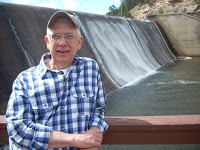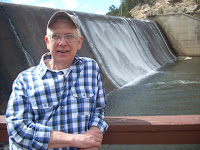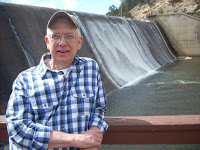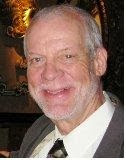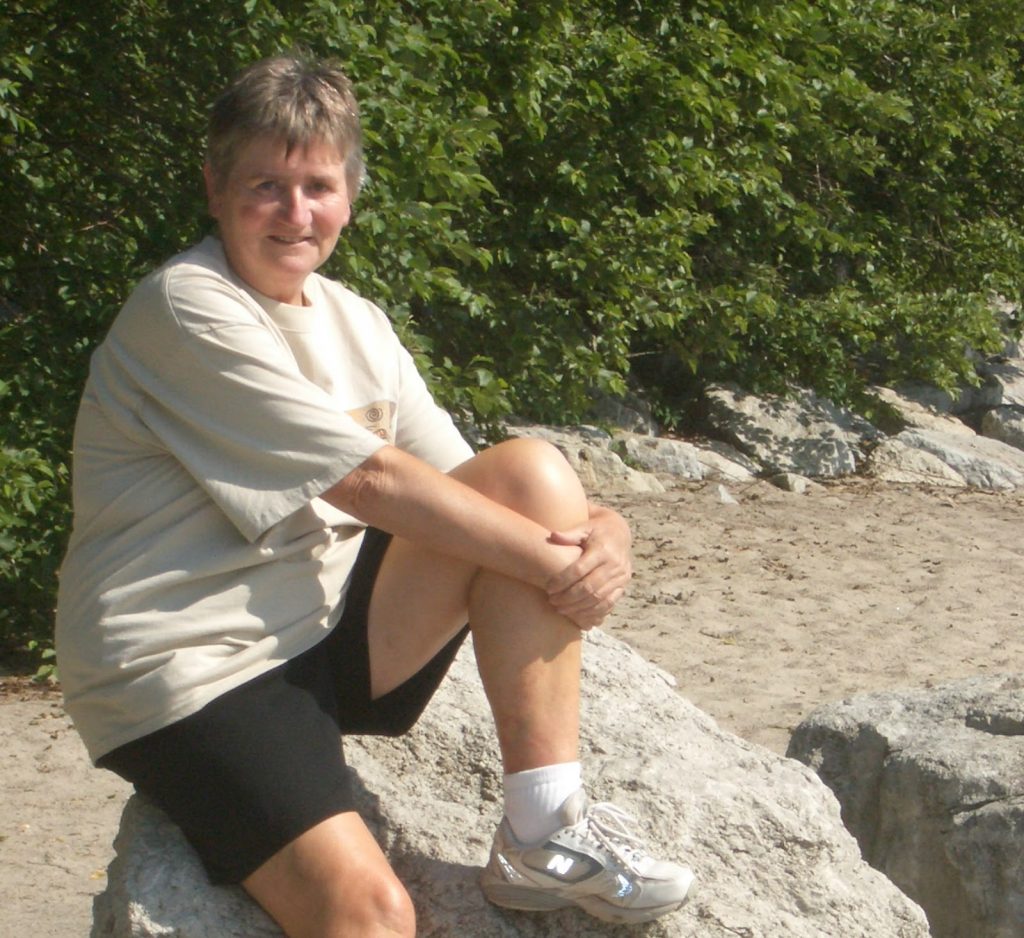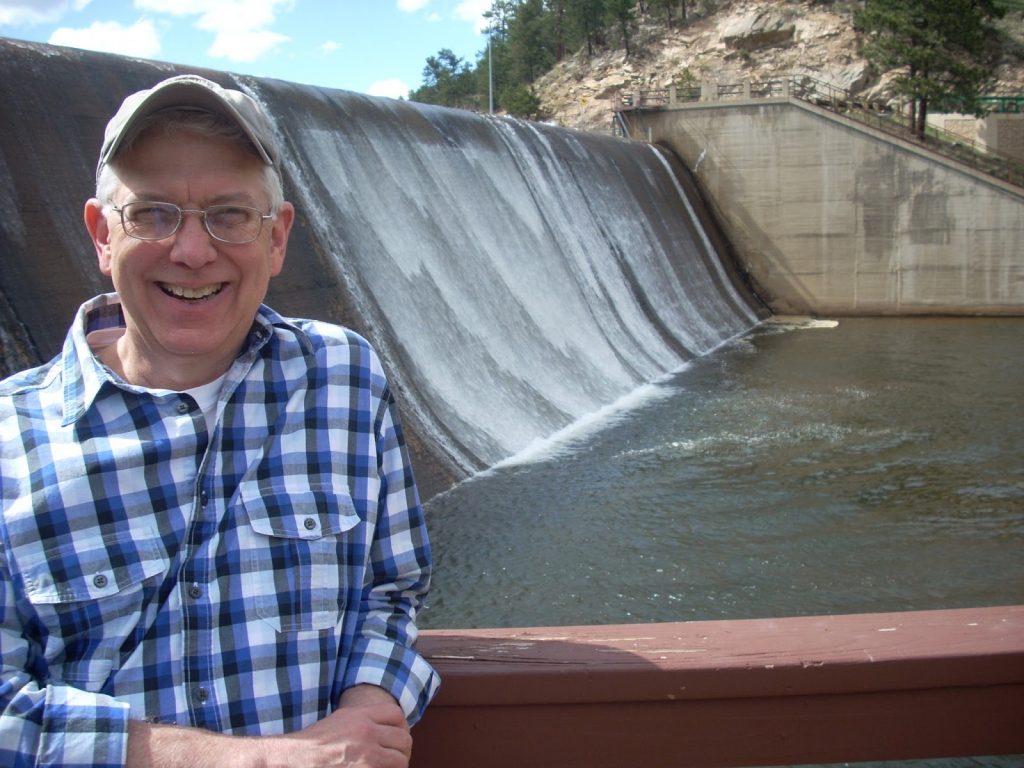Last year I documented how I write my stories for this group under the title of Writing My Story. So this time, I choose to write about someone else’s writing, Tyler Myers’.
 |
Tyler Myers
STHS Class of 2013 |
“From the US, Tyler Myers!” The head of the Russian Forest Service intones these words as the stage coordinator escorts me to center stage. The Forest Service director speaks with a language unfamiliar to me; however, I understand one phrase: my name. The crowd cheers, for they understand every remark the host exclaims. The noise makes the situation more difficult because—now—I can’t hear a word he says. A man approaches me, handing me a certificate and a medal. The medal has the Roman numeral “III” engraved on the face of it. Now I get it.
Standing on the stage, I remember the comments: “You really think you’ll go?” “Your project isn’t that amazing,” and “Do you even understand the statistics?” The remarks don’t matter now. As I stand in Moscow, I receive confirmation that the summer I spent working on the study deserved recognition, regardless of what others told me. My reminiscing changes to a rant as the rest of the top projects receive recognition. Why isn’t anything good enough for them? Why must they criticize everything I do? My friends are starting to think I’m insane for taking on so many challenges, so why can’t my family see it? My understanding deepens as the spot light widens to display the top three contestants.
My questioning of the past leads me to remember why I try so hard to begin with. Even when I mentioned an opportunity to work with the Forest Service’s Regional Ecologist to develop a project, my mom remained unaffected. She laughed when I told her of the deadline for the project, claiming that I should use my time to work this summer and make some money. Much to her surprise, I landed a job with the Forest Service as a Botanist and Aquatics crew member and, in my free time, completed the project. Ultimately, I wished for any positive reaction from her, any type of motivation or encouragement besides her posting pictures of me on Facebook, boasting to her friends. Regardless of my actions, she remains uninterested. From the AP classes to the varsity letters to the clubs I ran on a weekly basis, she remains distant. As I stand on stage, my disposition changes as I realize I wouldn’t have taken on some of the early challenges and developed my habit to get involved if it wasn’t for my family’s harsh comments. I begin to appreciate the high standard I hold myself to; however, now I can’t resist getting involved. This time—this project—and the accomplishments to come, they start, and end, simply with my impulse to achieve.
Now there’s an idea, my life as an extended metaphor. Ok then, now what should I be? How about a diamond—under pressure, showing perfection—Nah, that’s too cliché. Oh, I got it; a calculator—a useful object with a nerdy connotation—on second thought, I can do more than just math. Well how about something abstract? I am the derivative of x3 and my slope is always positive—except when x=0—only becoming greater as time progresses. Well, lets be honest; if I plan to go that route, I might as well be the calculator. What if I am the Earth and each of my friends and family members feed off of my resources causing me to become drained? Well, I can see that being more creative but I don’t think everyone necessarily feeds on me; they aren’t all parasites.
Ok, so now that I know metaphors aren’t my thing, what else can I do? If I think back to second grade, I do remember stories being quite enjoyable, so maybe an anecdote is my ticket to writing a witty personal statement. I’ll start by introducing my alien nature amongst generally everyone. Now let me introduce my low-income family: with my video gaming brother, assumed to be gangster brother, non-existent father and PTSD mom. Or, I can describe how I struggle to fit in at home, where intelligence is labeled as disrespect, and at school, where people treat me like I’m too far out there; ultimately I’ll describe my situation in which there isn’t a niche for a person with an interest for sports, music, school, and the environment. Ok, so I am alienated. Aren’t I supposed to come out victorious or something?
All right, Tyler—BAM!—Problem solved. I can get over it—all of it. My mom was in abusive relationships and that led to psychotic people sabotaging our house by rerouting the ventilation system.
From that, I don’t trust many people—if any at all. Now I’m independent. My mom drags the past into the future constantly and doesn’t trust my friends or me. She also insists on criticizing anything I do. From her, I can deal with the most paranoid people and rely on myself for motivation. Now I’m compassionate and self-motivated. My father abandoned my mother, brother, and I, forcing us to live without a father figure or another parent for support. His absence led to me working to help my family and working alone to learn due to the lack of education on my mother’s behalf. Now I can shop for a family, budget money, and learn skills like playing the guitar, playing the bass, math, and English independently.
Through the persistence of time, memories such as these, and many others, dissipate leaving only the shape of the character they molded. Their significance doesn’t exist in the fact that the event took place; rather, the importance of my memories—the persistence of my memories—exists in the dents the occurrence left on my character.
Well, I guess I don’t need an extended metaphor after all.
In the inland of South America, a co-worker approaches me to describe the nature of the situation; of course, to my liking, he replies in Spanish. He explains how the deforestation of the local forests has decreased due to our implemented regulations on the removal of trees and we are now in a state of soil and forest restoration. He continues to explain that we can now retreat to my engineering firm’s headquarters to finish our work on the other various environmental issues involving deforestation and energy consumption. As I hear the update, the news causes me to appreciate the reality of the situation…oh wait; I guess I am ten years ahead of myself.
As far as my goals go, I figure I have set myself up for a rigorous path, yet, I know I wouldn’t want my life aspirations to be any different. I see that, when I look as my past, I could have earned higher grades if I cut Cross Country Running, Cross Country Skiing, and Track and Field out of my life, but most of my friends come from my extracurricular activities; I also see how my GPA could have improved if I dropped Orchestra for another AP class. Still, I feel uneasy at the thought of dropping things like Generation Green and Glee Club. It is stressful being the president of both of the clubs, but the involvement with the environment and the students who love to sing is irreplaceable.
Recently, I have reached the point in the high school student’s life where the college financial reality hits—and it isn’t gentle. Even with the help of FAFSA, various colleges cost $40,000 to attend and, honestly, that is an expensive price for to pay. Sincerely, I believe any scholarship can help me complete college.
Tyler Myers
Tyler’s photo and writings included with his permission.
My high school class of 1966 established a modest scholarship fund a few years ago. The past two years I have been one of 18 classmates who review the final list of applicants and vote on who should receive the modest funds. In the past, we have awarded one student a $200 scholarship. This year, due to a “last minute” donation of $25,000, we elected to give a $2,000 scholarship to each of three students.
We evaluated seven finalists that one of my best friends in high school culled from all the applicants. A week ago Saturday afternoon, I received an email listing the three selectees along with a table showing how each of the evaluators gave out the points used for voting. Two of my three picks won. All the applicants have excellent grade point averages so I based my selection primarily, but not exclusively, upon the writing samples on the student’s application. One of my choices, Tyler, actually would have won even if we had awarded only one scholarship.
The week before the release of the winner’s names, I had wanted to email Tyler and comment on his writing sample after I submitted my choices; but I never did. After reading his name as a scholarship winner, I could not contain myself and did email him around midnight Saturday night Sunday morning.
My email said in part, “… Upon reading your “Student Summary” section, I concluded that I have no idea what kind of an Environmental Engineer you would become. However, I do believe you could have a career in writing or journalism. I really enjoyed the creativity and the way you expressed your ideas. I hope you continue to develop your skill in this area. Congratulations and best of luck in your future.”
Surprisingly, within a few minutes, Tyler replied to my email. “Thank you so much for the compliment! I am actually pretty excited to hear that my creative writing skills come off as impressive rather than corny 🙂
So does this email mean I am a recipient of the scholarship?
And thank you again for the delightful email. It was a brightening addition to my night.”
I responded to his question with the following. “I am sure I am not supposed to have emailed you at this point (but no one said not to either and I’ve pretty much been a rule breaker most of my life) and I wanted to do it last week
right after I reviewed your application and before results were sent out to all the reviewers, but did not. I just received the results today. Your counselors know of course, and I just could not wait any longer than now to make my comments.
You are shortly to be an STHS grad and I know you already have figured out what “congratulations” implies. Tell your family of course, but keep the secret from others until the results are officially announced. (If you are like I was at your age, you won’t keep the secret. Just be considerate of those who also applied but are still waiting to hear since you probably don’t know exactly who else applied.)
Another thing, this year we are giving out 3 scholarships instead of just one. Contact me again after the official announcement and I’ll tell you one more thing you might want to know.
Now just one last thing…it’s 1:18 AM in Denver so it is 12:18 AM in South Lake Tahoe…go to bed and get some sleep. I lived on 4 hours of sleep all through high school and nothing good came of it.”
You may have noticed that I did not tell Tyler of the amount of the award. It is likely that when he applied, he knew we only give out $200. He probably does not know of the increase, so I left him and the others to be surprised.
I want to believe that my few words of encouragement may lead to Tyler writing the “great American environmental engineer novel” someday and perhaps being recognized as the 21st Century’s equivalent of Mark Twain. Maybe I should write him again and remind him that our farming economy thrives on corn and so he should keep writing what he termed “corny” stories.
© 13 May 2013
About the Author
I was born in June of 1948 in Los Angeles, living first in Lawndale and then in Redondo Beach. Just prior to turning 8 years old in 1956, I began living with my grandparents on their farm in Isanti County, Minnesota for two years during which time my parents divorced.
When united with my mother and stepfather two years later in 1958, I lived first at Emerald Bay and then at South Lake Tahoe, California, graduating from South Tahoe High School in 1966. After three tours of duty with the Air Force, I moved to Denver, Colorado where I lived with my wife and four children until her passing away from complications of breast cancer four days after the 9-11 terrorist attack.
I came out as a gay man in the summer of 2010. I find writing these memories to be therapeutic.
My story blog is TheTahoeBoy.Blogspot.com



